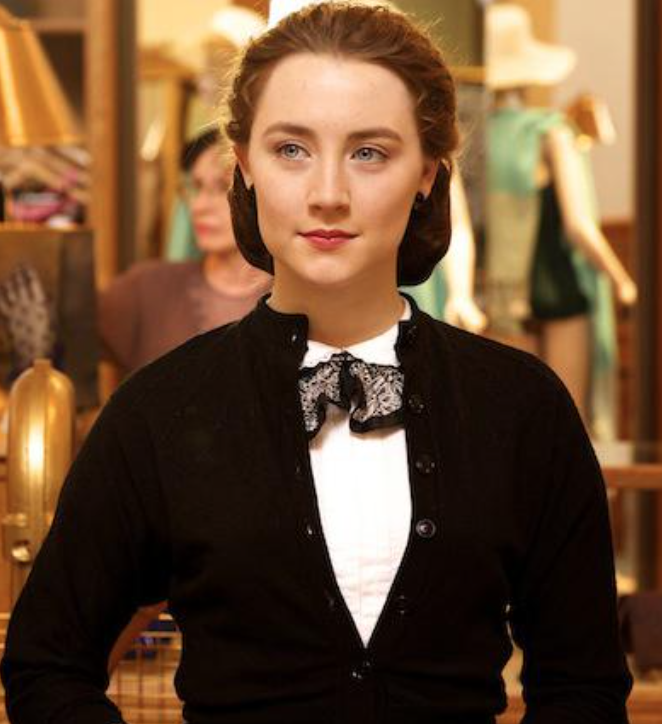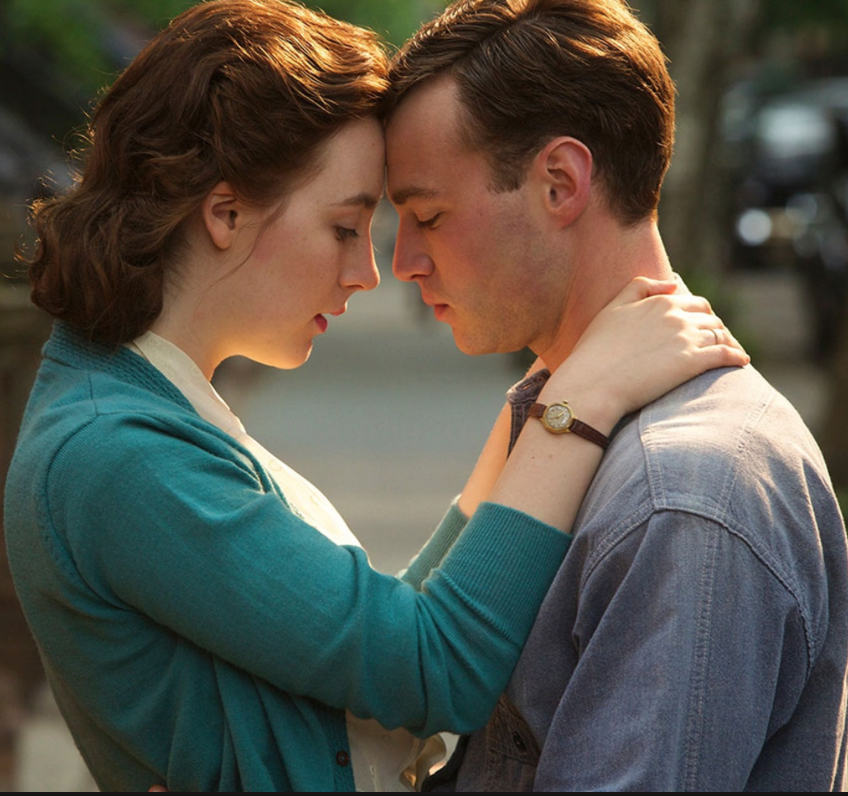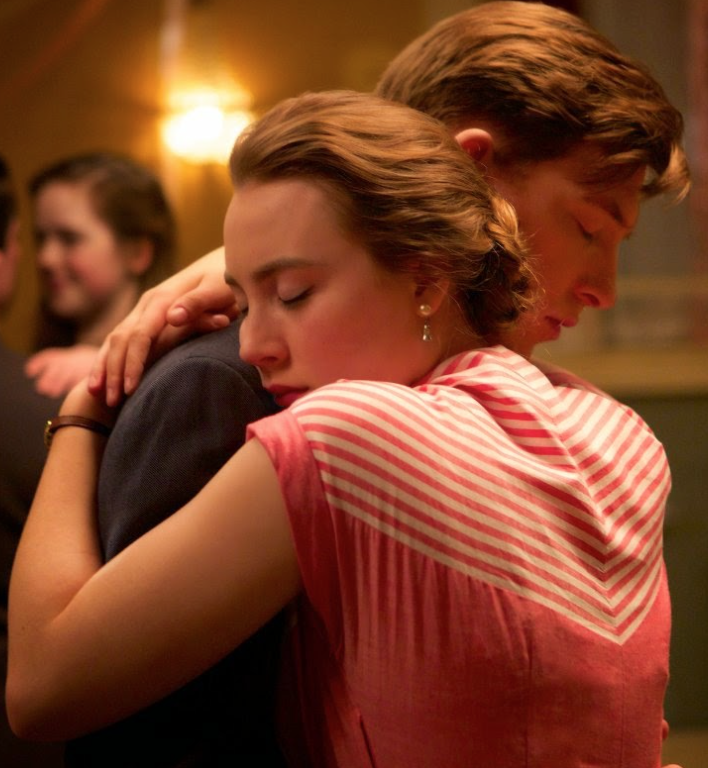 Colm Tóibín’s Brooklyn (2010) is a lovely novel. About Eilis, a 1950s Irish girl who moves to America but feels the pull of her homeland, it offers gently powerful insights about the complexity of the immigration experience. Restrained and wonderfully quiet, this is just the sort of novel that doesn’t translate well to the big screen. Yet “Brooklyn,” written by bad-boy author Nick Hornby and directed by John Crowley, is an equally lovely film, one that captures all the nuance of its antecedent without resorting to the clichés that can doom period adaptations. There’s not even a voiceover.
Colm Tóibín’s Brooklyn (2010) is a lovely novel. About Eilis, a 1950s Irish girl who moves to America but feels the pull of her homeland, it offers gently powerful insights about the complexity of the immigration experience. Restrained and wonderfully quiet, this is just the sort of novel that doesn’t translate well to the big screen. Yet “Brooklyn,” written by bad-boy author Nick Hornby and directed by John Crowley, is an equally lovely film, one that captures all the nuance of its antecedent without resorting to the clichés that can doom period adaptations. There’s not even a voiceover.
Saoirse Ronan stars, and it’s her best performance to date, which is really saying something. Since the beginning of her career, the twenty-one-year-old Irish actress has summoned a clear-eyed gravity that has worked equally well in bad-ass YA sagas (“Hanna,” “How We Live Now”) as in Oscar-baiting epics (“Atonement,” “The Lovely Bones”). Eilis is one of her first grown-up roles, and rather than succumbing to the self-consciousness that typically afflicts former child actors, she channels her new adulthood – sometimes peacocky, sometimes clumsy – as if it’s just another tool of her corporeal instrument. Such physicality is handy in this exceptionally nonverbal story, in which most people say the opposite of what they are feeling, if they say anything at all. (Not for nothing did Freud declare the Irish the only people impervious to psychoanalysis.)
As the film begins, Eilis is poised to leave her small Irish village; insular and economically depressed, it’s no place for a bookish girl who doesn’t miss a beat. Her long-suffering mother (Jane Brennan) may not be supportive, but big sister Rose (Fiona Glascott), who functions more as an emotional fairy godmother than a sibling, encourages her pursuit of a bigger, bolder life. From the minute Eilis steps aboard the ship to Brooklyn, though, she is afflicted with a strain of homesickness so malignant that it seems like a life-threatening disease. Aided by a kindly priest (Jim Broadbent in his old-soul mode), she finds work as a department store clerk and lodging in a rooming house (Julie Walters is hilariously haughty as her busybody landlady), and she  enrolls in accounting classes at a local college. But it’s only when she meets plumber Tony (Emory Cohen), a Brando-style dreamboat so taken by Eilis’s baby blues that his hangdog sincerity doesn’t seem like a put-on, that she starts to feel comfortable in her new home. She even buys movie-star sunglasses.
enrolls in accounting classes at a local college. But it’s only when she meets plumber Tony (Emory Cohen), a Brando-style dreamboat so taken by Eilis’s baby blues that his hangdog sincerity doesn’t seem like a put-on, that she starts to feel comfortable in her new home. She even buys movie-star sunglasses.
Family tragedy calls her back to Éire, which proves more hospitable upon her return. She finds bookkeeping work and, more to the point, a suitor: gangly, endearingly rueful Jim (Domhnall Gleeson), a well-off local boy who never gave her the time of day before she acquired American glamour. Her mother approves – she makes it clear the girl’s duty is to stay home (though she never says so, passive-aggressive parenting apparently being an international phenomenon) – and for a while Eilis doesn’t even answer poor Tony’s letters.
It helps here that both beaus are so appealing. Though you could argue that their overwhelming niceness lessens the dramatic tension, the men’s temperaments so perfectly reflect their countries of origin – Tony is more extemporaneous and heart-on-his-sleeve; Jim is cozier and more erudite – that it’s plain her conflict isn’t just about the men themselves. It is also about how, once you leave your homeland, you never feel that you entirely belong anywhere.
Here I must admit to a predilection for immigration sagas across the board, from “Godfather 2” to James Gray’s under-seen “The Immigrant.” These are the stories upon which American life – city life, in particular – is built, and “Brooklyn” stands out as an addition to the genre, especially as it’s one of the few that focuses on an unattached woman’s experience. Although this film is set in the mid-twentieth century, it seems as if it takes place even earlier, partly because of the tremendous contrast in progress between Ireland and New York City during that time and partly because something in plucky yet prim Eilis seems oddly Victorian.
 Crowley leans into that old-fashioned charm. Best known as a theater director, he draws upon that background to coax unshowily high-octane performances from his actors but you get the sense he’s ecstatic to sink his fangs into a period film. Backdrops look like Hollywood sound stages in the very best of ways, and the proliferation of “Singing in the Rain” references hardly seems a coincidence. Aided by Michael Brook’s swoony score, the perfectly lit and designed interiors, old-timey cityscapes, and stunning country skies make this film seem like it’s not just about but from a less cynical, more gorgeously misty-eyed era. You can just imagine these characters plunking down fifty cents to see it.
Crowley leans into that old-fashioned charm. Best known as a theater director, he draws upon that background to coax unshowily high-octane performances from his actors but you get the sense he’s ecstatic to sink his fangs into a period film. Backdrops look like Hollywood sound stages in the very best of ways, and the proliferation of “Singing in the Rain” references hardly seems a coincidence. Aided by Michael Brook’s swoony score, the perfectly lit and designed interiors, old-timey cityscapes, and stunning country skies make this film seem like it’s not just about but from a less cynical, more gorgeously misty-eyed era. You can just imagine these characters plunking down fifty cents to see it.
This was originally published in Word and Film.
